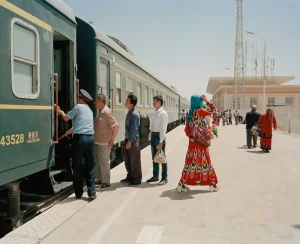A Thornbush in the Desert
January 14, 2025

Uyghur travelers at the Kashgar Railway Station, Xinjiang Uyghur Autonomous Region, 2016
Abduweli Ayup was born in 1973 in Upal, a town close to the city of Kashgar in the far west of the Xinjiang Uyghur Autonomous Region—or East Turkestan, as many Uyghurs prefer to call their homeland. Upal is where the medieval linguist Mahmud al-Kashgari is buried. When he was a child, Abduweli’s father, Ayup, often took him to visit the shrine. Ayup was a member of the Communist Party and taught in state schools.
During the Cultural Revolution he was “sent down” to work on a pig farm. The Han cadres who worked beside him later rose to high positions in the regional government, but his standing never fully recovered.
Inspired by Kashgari, Abduweli studied Turkic philology at Minzu University in Beijing, which is dedicated to China’s ethnic minorities. There he met Ilham Tohti—an economics professor and civil rights activist, sometimes referred to as “The Uyghur Mandela,” who in 2014 was sentenced to life in prison on charges of “separatism”—and fell in with a circle of Uyghur students Ilham mentored. In 2009 Abduweli received a Ford Foundation scholarship to pursue a graduate degree in linguistics in the United States. He was admitted to Stanford and Columbia but chose the University of Kansas in Lawrence to experience “the real America.” A few weeks after he arrived, a video spread across Xinjiang: almost two thousand miles away, at a toy factory in southeastern China, Han employees had attacked Uyghur migrant workers over rape allegations (which officials later found to be false) and, after an hours-long brawl, killed two Uyghur men.
On July 5 Uyghurs demonstrated on the streets of Xinjiang’s capital, Ürümchi. They demanded not only justice for the victims but also social equality. Many waved the Chinese flag. When the police responded with force, a riot broke out: some Uyghurs attacked Han neighborhoods, and two days later Han mobs retaliated. Around two hundred people died. The military was deployed; dozens of Uyghurs were disappeared; Beijing imposed a communications blackout on the region. Abduweli lost contact with his wife, Mihrigül, and young daughter, Mesude, until they called from Shanghai nine months later. Sympathetic university administrators enrolled Mihrigül so she and Mesude could obtain passports and exit visas—a challenge for any Uyghur, and especially one who was in Ürümchi on July 5.
Mesude loved America. She picked up English and refused to speak her mother tongue. Abduweli, who was studying linguistics precisely to revive Uyghur education, realized his work would have to begin sooner than expected. Against everyone’s advice, he decided to return with his family.
